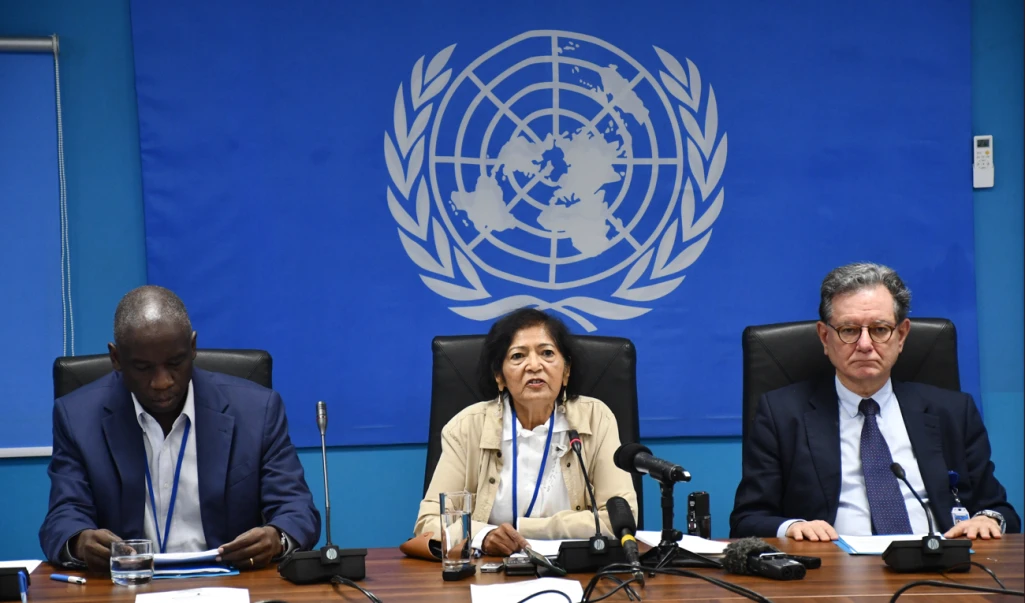
South Sudan's leaders are inciting violence, impeding peace
efforts, and allowing serious human rights violations, according to a new
report from the UN Commission on Human Rights in South Sudan.
In order to avoid sabotaging the nation's political
transition, the commission advised authorities to eradicate corruption and
impunity.
The commission presented its findings at the UN Human Rights
Council in Geneva on Friday, releasing a 24-page report along with a 10-page summary detailing key violations and
systemic failures.
“It is unconscionable that so many years after its
independence, and despite their peace commitments, political leaders continue
their violent contestations across the country and are abjectly failing the
people of South Sudan,” said Yasmin Sooka, Chair of the Commission.
“Our investigations in 2024 identified the same patterns of
gross violations in the same places, often implicating the same public and
military offices. Sexual violence persists both in and outside conflicts, even
as senior officials continue to endorse extrajudicial killings, and the forced
recruitment and abduction of boys and girls into combat or sexual slavery
continue unchecked.”
The report, based mostly on the Commission's independent
investigations in South Sudan until 2024, as well as engagements with
authorities, open-source, and forensic information, demonstrates how political
and military elites continue to fuel bloodshed and instability.
It outlines the scenario in Tambura, where armed forces and
militias carried out extreme violence against people along ethnic lines in
2024, exacerbating the unresolved traumas and divisions left over from the 2021
conflict.
Local and national political elites are complicit in
pursuing violent, divisive politics; many have maintained public and military
positions despite previous infractions and have not been held accountable for
their crimes.
“The testimonies of children forced into combat or held as
sexual slaves underscore a systemic failure to protect South Sudan’s future
generation,” Sooka emphasized.
In September 2024, parties to the revitalized agreement
agreed to a two-year extension of its transitional political arrangements,
which began this week.
Although 'severe funding limitations' were used to justify
the extension, the commission's study states that between September 2022 and
August 2024, government revenues neared $3.5 billion, mostly from oil.
However, there are still unpaid civil personnel, underfunded
judicial institutions, and deteriorating courts, hospitals, and schools.
“Financing essential services and rule of law institutions
requires an end to the corruption. The theft of national wealth robs citizens
of justice, education, and healthcare. Without addressing this systemic
looting, no peace agreement will ever translate into meaningful change,” said
Commissioner Carlos Castresana Fernández.
The report explores the introduction in 2024 of the
"Green Book" state statute in Warrap, which authorizes extrajudicial
killings by firing squads for alleged livestock raiding and intracommunal
conflict.
The commission discovered that this statute has fostered a
culture of lawlessness, involving senior officials and the state government in
serious human rights breaches.
The selective use of 'Green Book' violations to prosecute
certain factions in intra-communal confrontations raises tensions.
Warrap's court, hampered by the appointment of only one
judge for the entire state and little money, denies victims justice and
perpetuates cycles of revenge.
“Warrap’s judiciary requires urgent funding and support, or
violence will remain the default form of justice,” Fernández added.
During their visit to South Sudan last week, the three
commissioners met with survivors of human rights violations.
In her statement to the Council today, Sooka highlighted
these engagements, echoing civil society and international partners’ concerns
over the entrenched repression and lack of political will to break cycles of
gross human rights violations.
The commissioners also underscored the government’s
longstanding neglect of essential institutions, including courts, hospitals,
schools, and welfare services.
The government of South Sudan has yet to comment on the
report.
The Commission on Human Rights in South Sudan is an
independent body mandated by the United Nations Human Rights Council.
Since its establishment in March 2016, it has undergone annual renewals. The three commissioners serve independently in their capacity as experts and are not part of the UN staff. They are supported by a secretariat based in Juba, South Sudan.